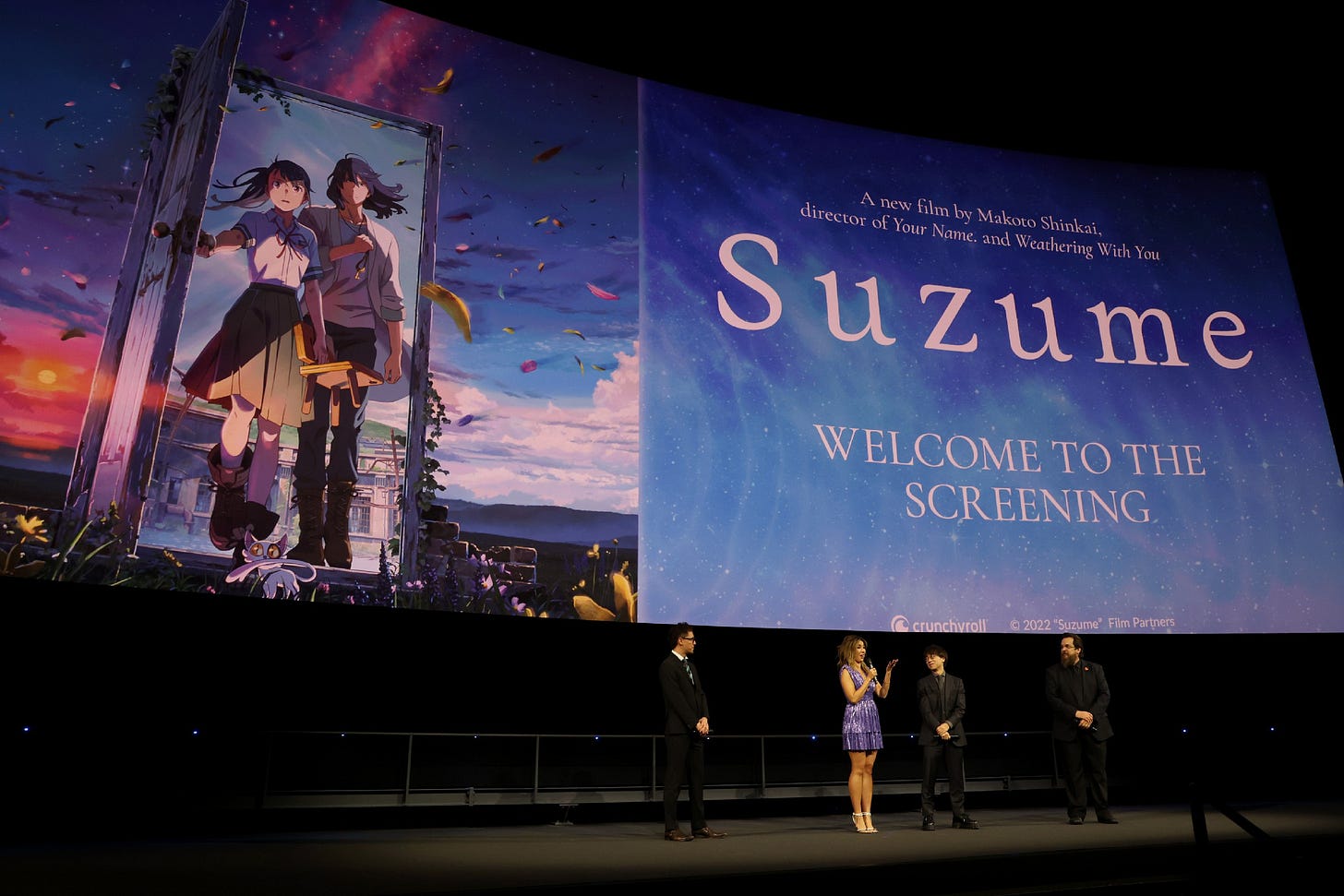North America brings "superior" anime profits
Plus: Crunchyroll pitches anime to movie theater owners; Hollywood renews anti-piracy deal with Japan; Manga sales contract after record years; and more
This is your weekly Animenomics briefing, covering the business of anime and manga. Today is Wednesday, April 17, 2024.
In case you missed it: Inuhiko Doronoda’s Walking to Space Together, published by Kodansha, was named the winner of the 2024 Cartoon Grand Prize by a panel of 98 bookstore employees and manga enthusiasts.
Why it matters: A manga editor recruited Doronoda after reading her work at Comitia, a self-published manga marketplace held four times a year that has gained a reputation among publishers as a place for discovering new artists.
Anime’s U.S. success drives Toho’s overseas expansion

Japan’s largest film distributor Toho is focusing its anime business on the North American market as the company looks to expand global operations under a new subsidiary.
Why it matters: Since Toho consolidated its anime operations into a fourth pillar of business in 2022, overseas revenue for that division has grown steadily.
By the numbers: Toho Animation saw revenue grow 91 percent to ¥46.3 billion (US$299 million) in the most recent fiscal year ending February 2024.
Overseas sales grew nearly 78 percent to ¥15.8 billion (US$102 million) and is nearly three times the number from two years ago, now making up one-third of Toho Animation’s entire sales.
Strong sales by properties like Spy × Family, Jujutsu Kaisen, My Hero Academia, and Haikyu!! drove revenue growth in streaming, theatrical distribution, and merchandising.
What they’re saying: “North America is superior in terms of profits and revenue,” Toho president Hiroyasu Matsuoka said in a VIPO Academy lecture in November.
He pointed to Makoto Shinkai’s Suzume as an example of Toho’s success in the region, where the company negotiated 50 percent of box office revenue.
By comparison, despite Suzume’s record-breaking performance in China, Toho only earned a 20-percent share of box office revenue in the country.
Matsuoka argued even the South Korean market may be a better investment than China for Toho, even though overall box office revenue there is still half of pre-pandemic levels.
What we’re watching: The Yomiuri Shimbun reported this month that Toho Global, a subsidiary established last July to supervise overseas operations, has started planning projects in the United States with its Los Angeles unit.
“I think Japanese anime has an important place in the American theater business,” Matsuoka said.
Crunchyroll calls for more anime films in movie theaters

In a headline presentation at CinemaCon last week, Crunchyroll made the case for the movie theater industry to bring more anime films to audiences across North America and beyond.
Why it matters: In the age of streaming, movie theaters have tried to adjust their business models to attract niche audiences seeking unique theatrical experiences, according to Next Best Picture.
CinemaCon caters to movie theater owners and exhibitors, who make the decisions on what films to screen and for how long.
The details: Senior vice president of global commerce Mitchel Berger argued on behalf of Crunchyroll that the anime audience isn’t too niche for movie theaters.
“Ten years ago globally, anime generated US$14 billion. Now that number is closer to US$37 billion,” Berger told his audience.
He highlighed that Crunchyroll’s demographic data “over-index on Black, Hispanic, Asian American, and LGBTQ audiences” and that they remain fans of anime for life.
Zoom in: Crunchyroll highlighted Haikyu!! The Dumpster Battle, Blue Lock: Episode Nagi, and Overlord: The Sacred Kingdom to CinemaCon attendees, showcasing how niche anime content can vary from one to the next.
The company also gave attendees a preview of the first ten minutes of Spy × Family Code: White, which opens in North American theaters this weekend.
Reality check: While Berger is optimistic about the reception to his presentation, media outlets have characterized the response from CinemaCon’s predominantly older white male demographic as “polite applause”.
Clippings: Japan and Hollywood renew anti-piracy deal

A ten-year anti-piracy agreement between Japan’s Content Overseas Distribution Association (CODA) and the Washington, D.C.-based Motion Picture Association received a two-year extension through 2026. (Press release)
Why it matters: As international demand for Japanese content reaches record levels, joint enforcement against online piracy is a boost for CODA members, which include more than two dozen anime investors, TorrentFreak reports.
One in four customers who use the Japanese proxy shopping service ZenMarket use it to buy anime merchandise. The platform brings in more than ¥500 million (US$3.2 million) a month, operator ZenGroup reported in 2022. (Press release)
Reading app VIZ Manga has launched service in the United Kingdom, Ireland, Australia, and New Zealand. Manga titles receiving simultaneous publication in North America will also be available in these regions, VIZ Media says. (Anime News Network)
Crunchyroll COO wants more anime at film awards
“Two anime films were nominated for Best Animated Feature this year by the Golden Globes. We were so, so proud of that moment. And then I took a step back, and I thought this shouldn’t be an exception. We had assumed that there was one slot for an underrepresented group, that there’s one seat at the table, that there’s room for one nomination. That just shows how much progress still needs to happen.”
— Gita Rebbapragada, Crunchyroll chief operating officer
Context: Speaking at the Asia Society Southern California’s Asian Women Empowered luncheon in February, Rebbapragada discussed Suzume’s nomination in the 81st Golden Globe Awards alongside The Boy and the Heron.
Background: Suzume, distributed in North America by Crunchyroll, surprised film critics with its nomination in a year where Hayao Miyazaki’s The Boy and the Heron was expected to be anime’s representative in the awards circuit.
“We are about supporting the entire ecosystem of anime, whether that is on the Crunchyroll streaming service or others,” Rebbapragada later explained in a panel discussion. “Because of that, we structure our relationships in a slightly different way, where if there is success, there is mutual success for us and our partners.”
U.S. manga sales slump after back-to-back record years
Manga sales in the United States declined last year after dominating all graphic novel sales at the peak of the COVID-19 pandemic, according to an analysis of Circana BookScan data by The Beat.
Why it matters: Manga sales has been the primary driver of growth in the U.S. comics market in recent years, but publishers have described last year’s decline as “inevitable”.
For the first time since 2020, more units of western graphic novels were sold than of manga.
By the numbers: Circana BookScan, which collects data from more than 7,500 sales locations, estimates that 21.8 million units of manga were sold last year, down 26 percent from 2022.
VIZ Media remains the dominant manga publisher in the U.S., with its manga titles accounting for 57 percent of units sold.
Other major players include Yen Press (13 percent), Kodansha Comics (13 percent), Seven Seas (9 percent), Dark Horse Manga (4 percent), and Square Enix (2 percent).
Total retail value of manga sold, which does not represent actual sales value, fell 13 percent to US$381 million.
Of note: Kodansha Comics lost market share compared to 2022, attributed to a significant decline in unit sales of Attack on Titan, which fell 56 percent.
Animenomics is an independently-run and reader-supported publication. If you enjoyed this newsletter, consider sharing it with others.



